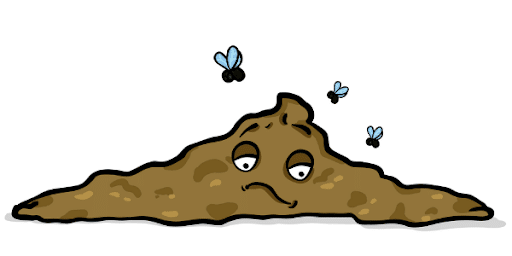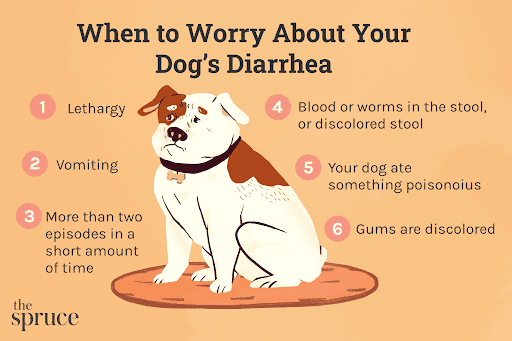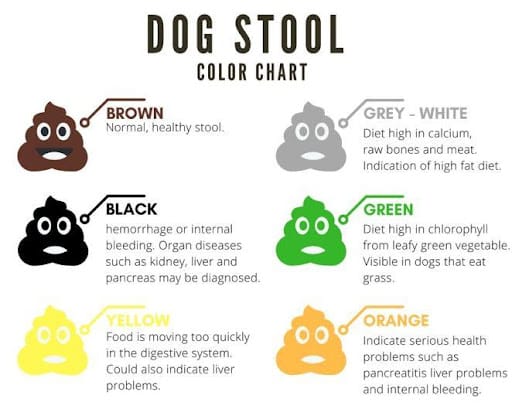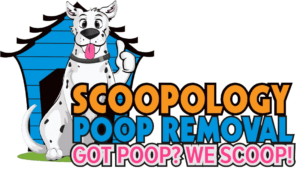On occasion our scoopologists come across the doggie “runs.” Stinky brown puddles are not only difficult to clean but concerning when we see it week after week in some yards. Depending on the consistency of the waste, we often clean doggie squirts without leaving residue. In other cases, we do the best we can scooping in multiple directions, but skid marks are often not preventable. Scoopology does offer yard sanitizing & deodorizing services to ensure those skid marks dissolve and the foul smell doesn’t linger. Of course, the best solution is to help your dog make those brown, solid but a bit squishy, one log-like pieces we love to scoop.
When our scoopologists notice doggie diarrhea is excessive or lasting for more than a week we will reach out to customers to alert them to the liquid issue. Most cases of diarrhea in dogs are not serious and will resolve themselves. Mild diarrhea cases are extremely common in dogs and often occur due to intestinal distress after eating an item that doesn’t agree with their body (e.g., table scraps) or you have recently switched your canine friend to a new dog food.

While diarrhea in dogs is common, there are a handful of other possible causes for your dog’s diarrhea that can be more serious. Knowing as much as possible about your dog’s squirts might help limit the number of times your dog has one of these unpleasant episodes and reduce the duration when the runs do come.
Canine salivary enzymes are mostly designed to kill bacteria, which is why they can tolerate items that would send their human companions to the hospital. That does not mean dog saliva is cleaner than that of humans. Harvard researchers have discovered over 615 different types of bacteria in human mouths, while over 600 different types have been found in dog mouths. Thus, dog saliva is definitely not cleaner than human saliva. Canine stomach acids, however, are about three times stronger than those of humans, so they can digest food that is pretty much intact. Under normal circumstances, transit time from mouth through the small and large intestines should be under 10 hours, producing a firm, well-formed stool at the end.
Below we have listed some of the most common causes of diarrhea in dogs:
- Eating garbage or spoiled food
- Stress or anxiety
- Change in diet or treats
- Ingestion of foreign objects such as toys, bones, and fabric
- Ingesting toxins or poisons
- Medications such as antibiotics
- Parasites – roundworms, hookworms, whipworms, Coccidia, or Giardia
- Viral infections such as parvovirus, distemper, or coronavirus
- Bacterial infections – such as salmonella
- Inflammatory bowel disease
- Pancreatitis
- Colitis
- Liver or kidney disease
- Intestinal cancer

If your dog has just had one episode of diarrhea and is otherwise behaving normally, it’s usually not a cause for concern. Keep an eye on your canine companion’s bowel movements and see if things clear up. Your Scoopology pet waste removal scoopologist will inform you if we notice the issue continues. If your dog has more than 2 episodes then there might be a problem, so it’s a good idea to call your vet if your pup has two or more bouts of diarrhea.
Recurring bouts of diarrhea over a short time period can be a sign of a very serious health issue, especially if your furry friend is very old, very young, or has a compromised immune system. Infections such as canine parvovirus are extremely serious, contagious, and life-threatening.
If your dog has any of the following symptoms, contact your vet immediately:
- Weakness
- Blood in stool
- Vomiting
- Unusual drooling
- Lack of Appetite
- Signs of dehydration (Sunken dry-looking eyes, dry nose, or dry, sticky gums)
- Lots of Water: Make sure your dog is drinking a lot of water. Just like people diarrhea can quickly make your dog dehydrated. If your dog isn’t interested in drinking water, you can encourage him by adding some chicken or beef broth to his water or make rice water.
- Pumpkin: Give your dog somepure pumpkin. Pumpkin is a great source of fiber and can help your pups upset belly quickly. A bonus tip: when we open a can of pumpkin, we take about half of it and freeze it into ice cube trays. This way you will always have pumpkin handy, they make great everyday treats too!
- Bland Diet: The best food for your dog with diarrhea is something bland like boiled chicken and rice. Stop feeding your dog his regular food and offer him a small amount of bland boiled chicken and white rice. Feed him small amounts at a time to make sure he can keep the food down. If so, then slowly feed him more and more until he is feeling better.
- Good Bacteria: Feed your dog some plain yogurt. Just like humans, dogs can benefit from the good bacteria found in yogurt. Stay away from the sugary filled yogurts, you want to find just plain yogurt. Adding a probiotic supplementto your dog’s daily food can help keep his gut health in check every day.
What Does Dog Stool Tell Us About Our Dogs’ Health?
If you have read this far you may be curious about what dog stool tells us about dog health. See the color chart below for your answers.

Note: The advice provided in this post is intended for informational purposes and does not constitute medical advice regarding pets. We are scoopologists (i.e., service scientists), not medical experts. For an accurate diagnosis of your pet’s condition, please make an appointment with your vet.
Poop scoop service removal technicians like our scoopologist at Scoopology Pet Waste Removal can help you identify the color of your dog’s poop and recommend local vets in your area if the problem persists. Call us at 360-612-7667 to schedule a weekly service. Scoopology serves King County, Pierce County, Kitsap County, Thurston County, Grays Harbor County, and Mason County.

